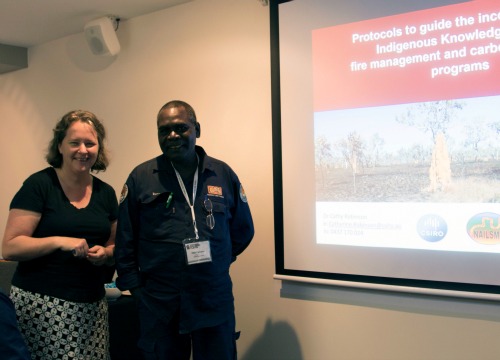20 January 2016
Dozens of fire practitioners shared their experiences of working with Indigenous fire knowledge in northern Australia during a workshop in Darwin late last year.

The CSIRO’s Dr Cathy Robinson, pictured with Otto Campion who was one of many Indigenous Elders and fire experts at the workshop who shared experiences of using Indigenous knowledge
The workshop, held during the Territory Natural Resource Management 2015 Conference, was part of a Hub project looking at how Indigenous Knowledge (IK) has been incorporated into fire management programs.
Aboriginal people have long traditions of systemically using fire to manage their customary landscapes for a range of purposes, the combined impacts of which can be seen in the defining features and health of Australia’s terrestrial biodiversity and ecosystems.
Project leader Dr Cathy Robinson from the CSIRO says there is significant interest from Indigenous groups across the country to engage with contemporary fire management projects.
“The workshop was a unique opportunity for both Indigenous and non-Indigenous practitioners to share stories and practical lessons about the opportunities and challenges of working with Indigenous fire knowledge,” Dr Robinson said.
“We had a range of groups from across northern Australia attend, including Traditional Owners, NGOs, scientists and government agencies, so it was a fantastic opportunity to showcase a range of fire management activities.”
Perspectives drawn from the workshop, as well as additional interviews and a review of existing literature will help to identify the key protocols and pathways for the future incorporation of IK into fire management.
Want to know more about the Resilient Landscapes Hub's activities and our research into practical solutions to environmental problems? Stay informed about activities, research, publications, events and more through the Hub newsletter.
"*" indicates required fields